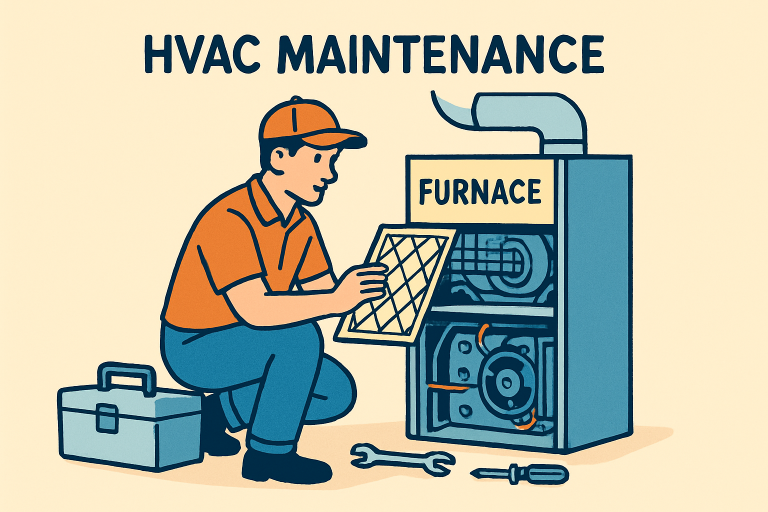HVAC
How Regular HVAC Maintenance Can Prevent Costly Repairs
Key Takeaways
- Routine HVAC maintenance identifies potential issues before they evolve into expensive failures.
- Optimized system performance translates into reduced energy bills and a lower carbon footprint.
- Proactive care extends the working life of heating and cooling equipment, delaying costly replacements.
- Cleaner systems promote better air quality and safer home environments.
Table of Contents
- Early Detection of Issues
- Enhancing Energy Efficiency
- Extending System Lifespan
- Improving Indoor Air Quality
- Ensuring Safety and Reliability
- Maintaining Manufacturer’s Warranty
- Recommended Maintenance Schedule
- DIY Maintenance Tips
Keeping your heating and cooling system in peak condition isn’t just about comfort—it’s a critical investment in your home’s longevity and efficiency. A commitment to ongoing maintenance can shield you from expensive emergency breakdowns, optimize energy consumption, and keep your home safe and secure. Whether you’re looking to lower monthly bills or avoid a surprise mid-season failure, prioritizing regular HVAC service is a smart move. Homeowners in the Willamette Valley have a range of professionals for furnace repair Salem, OR, in case bigger problems do arise. However, with consistent care, you can often avoid urgent situations altogether.
HVAC maintenance also leads to better indoor air quality and system reliability, issues that are often underestimated until a problem occurs. The cumulative impact of dust, pollen, and wear on system components makes preventive attention crucial for year-round comfort and health.
Early Detection of Issues
Scheduling regular inspections allows HVAC technicians to identify and resolve minor issues, such as frayed belts and clogged drain lines, before they escalate into more extensive system damage. Mechanical failures that start small can quickly cascade; for example, a simple refrigerant leak could strain the compressor, potentially resulting in a repair costing hundreds—or even necessitating a complete system replacement. Early detection can save homeowners significant sums and prevent the discomfort that comes with a sudden, unplanned outage. The New York Times Wirecutter recommends routine professional checkups to ensure optimal system health and performance.
Enhancing Energy Efficiency
When your HVAC equipment is clean and all parts are functioning as intended, less energy is needed to cool or heat your home. Tasks such as cleaning condenser coils, lubricating moving parts, and replacing dirty filters may seem basic, but each plays a crucial role in system efficiency. Dirty or neglected systems can use up to 20% more energy than those that are properly maintained, according to the U.S. Department of Energy. Lower monthly bills are a direct benefit, but greater energy efficiency also reduces wear, further preventing future failures.
Extending System Lifespan
Neglecting maintenance speeds the deterioration of key HVAC components. Over time, dirt buildup, excessive vibration, and friction from moving parts cause the system to work harder, which shortens its lifespan. Scheduling professional service—typically once in spring and once in autumn—can extend the working life of your air conditioner and furnace by several years, substantially delaying a costly full-system replacement. Preventive care thus maximizes your return on investment and makes your home more sustainable over time.
Improving Indoor Air Quality
The air you and your family breathe passes through HVAC filters, coils, and ducts—areas that can accumulate dust, pollen, bacteria, and mold if not cleaned regularly. Poor indoor air quality contributes to allergies and respiratory issues, particularly in children and the elderly. Replacing filters every one to three months and ensuring ductwork is free of debris are practices recommended by the Environmental Protection Agency to support healthier indoor environments. By prioritizing air system maintenance, you minimize airborne contaminants and maintain a comfortable living space year-round.

Ensuring Safety and Reliability
Regular HVAC inspections not only boost comfort but also reduce hazards. Gas- and electric-powered systems can pose fire risks, create the potential for carbon monoxide leaks, or trigger dangerous short circuits if not correctly maintained. Experienced technicians inspect for hidden safety issues, including blocked flues and poorly sealed connections, to ensure your equipment runs as reliably—and safely—as possible. Consistent care means you’re far less likely to experience a sudden breakdown during extreme temperatures, providing you with long-term peace of mind.
Maintaining Manufacturer’s Warranty
Most HVAC manufacturers require proof of annual maintenance as a condition for honoring system warranties. Without a record of professional checkups, any future repair or replacement costs might fall solely on the homeowner, even if the fault would otherwise be covered. Keeping all invoices and service report documents ensures your compliance, allowing repairs to be addressed under warranty whenever possible for optimal coverage and cost management.
Recommended Maintenance Schedule
Experts recommend biannual professional maintenance, performed once before the cooling season (spring) and again before the heating season (fall). This timing ensures your system is optimized for peak demand and any off-season wear is addressed beforehand. Homeowners’ proactive scheduling helps prevent last-minute emergencies when technicians are busiest, and it gives families peace of mind that their equipment is ready to handle seasonal extremes.
DIY Maintenance Tips
While technicians are vital for thorough inspections and in-depth servicing, homeowners play a crucial role in daily HVAC maintenance. Some straightforward habits can boost performance and avoid minor issues:
- Replace Air Filters: Switch filters monthly (or at least quarterly) to maintain healthy airflow and system efficiency.
- Clean Vents and Registers: Regularly dust and vacuum air grilles to prevent the buildup that can impede circulation.
- Clear Around Outdoor Units: Remove debris, leaves, and grass clippings from around the condenser to ensure unobstructed airflow.
Developing these habits complements annual or semi-annual professional service and helps protect your HVAC investment, ensuring comfort and reliability for many years.
In summary, regular HVAC maintenance is an affordable, proactive defense against costly repairs, energy waste, and system downtime. By making maintenance a routine part of homeownership, you ensure ongoing comfort, safety, and efficiency for your household.














